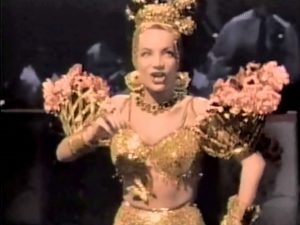Copacabana (1947) starring Groucho Marx, Carmen Miranda, Steve Cochran, Andy Russell, Gloria Jean
In Copacabana, a zany agent (Groucho Marx) double-books a Brazilian bombshell (Carmen Miranda) as a French singer, in the same club on the same night. Every night! Romantic shenanigans and songs ensue …
Review
Auditioning at the Copacabana

Devereaux manages to bluster his way into an audition at the hottest club in town – the Copacabana. Carmen does her Brazilian bombshell routine, and she’s a success. But the manager (Steve Cochran) wants to know what other acts he represents. And, of course, Devereaux has nothing. But the helpful male singer (Andy Russell) looks at Devereaux’s list of acts (actually a racing sheet) and suggests “Mademoiselle Fifi”. This leads into the central conflict, as Carmen has to do dual roles as heerself and the French Mademoiselle Fifi, both performing at the Copacabana. And “they” perform within minutes of each other! So, she learns how to be a quick change artist.
Romantic triangles
Soon, Steve is falling for Mademoiselle Fifi, and romancing her. Which makes Devereaux jealous, of course. And Steve’s girl Friday, the very sweet Gloria Jean, is jealous. She’s not mean to Fifi, but turns her angst inward. And Andy again tries to help. But frankly, it’s when Gloria Jean turns to Carmen (not Fifi) for advice, that the problem’s seemingly resolved. Acting like an older sister to protect Gloria, she stages a fight with “Fifi”. And, when Fifi’s disappeared, murder is suspected! With Devereaux as the prime suspect! But before then, Devereaux auditions his new act for the Copacabana — Groucho Marx! It’s a hilariously funny scene.
Conclusion
All ends happily, with Carmen “proving” that she’s actually Fifi by kissing a series of men …. And making Devereaux ever more jealous. Copacabana is a funny comedy, with enjoyable songs and performances that are short enough to not detract from the story.
Cast
- Groucho Marx (Double Dynamite) … Lionel Q. Devereaux. The failed performer, who tries to become the agent for his sweetheart/fiancee, Carmen.
- Carmen Miranda (Scared Stiff) … Carmen Navarro / Mademoiselle Fifi. The hispanic singer, who now has to pretend to be a French singer as well – Mademoisell Fifi!
- Steve Cochran (White Heat) … Steve Hunt. The owner/manager of the fancy Club Copacobana. He feels he has to romance Mme. Fifi to keep her at the club. Which causes trouble with Anne.
- Andy Russell (The Stork Club) … Andy Russell. The handsome singer, who’s alway willing to help. Which typically causes more trouble. Not the smartest person, but very likable with a beautiful voice.
- Gloria Jean (Never Give a Sucker an Even Break) … Anne Stuart. Steeve’s girl Friday, who’s indispensable to him and the club. And she thinks Steve’s in love with Fifi.
Songs
- We’ve Come to the Copa
- Tico Tico No Fubá
- Je Vous Aime
- My Heart Was Doing a Bolero
- He Hasn’t Got a Thing to Sell
- To Make a Hit with Fifi
- Stranger Things Have Happened
- Go West, Young Man
- Let’s Do the Copacabana
Editorial review of Copacabana courtesy of Amazon.com
Happily, Groucho is still Groucho in his first post-Marx brothers movie, and that’s enough to keep this showbiz farce going. The rather labored plot has Groucho getting his longtime fiancée, Carmen Miranda, booked at Manhattan’s glamorous Copacabana club, but as two different performers: a Brazilian bombshell (the usual Carmen Miranda act, without the pineapple on the head) and a veiled French chanteuse called Mademoiselle Fifi.
Some of the nightclub stuff has a retro appeal, and the appearance of real-life showbiz columnists (like Earl Wilson) brings a whiff of Sweet Smell of Success. But mostly there’s Groucho, still flinging one-liners in a zone of his own. Even when the material isn’t first-rate, his delivery never wavers from the withering skepticism of the Marx brothers’ early days. The old greasepaint mustache comes out for one typically Marxist number, with the remainder of the songs handled by Miranda and wet-eyed crooner Andy Russell. –Robert Horton
(Editor’s note: originally published at Famous Clowns, used with permission)